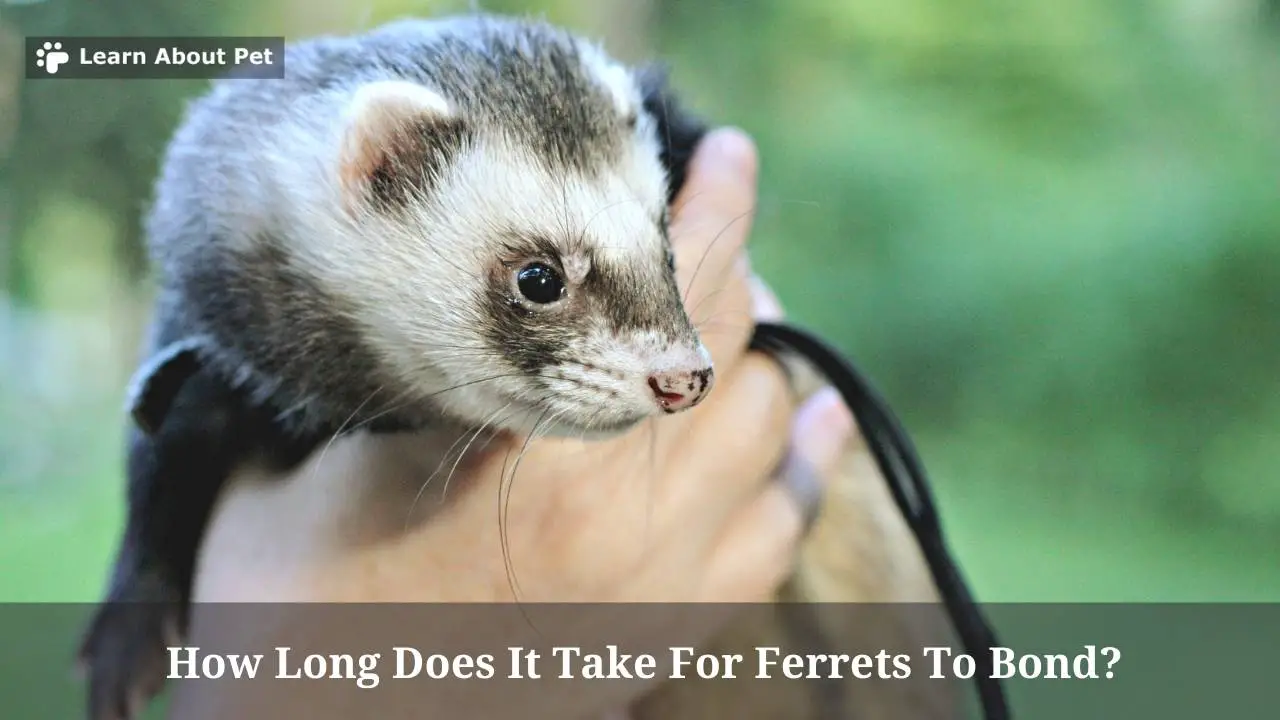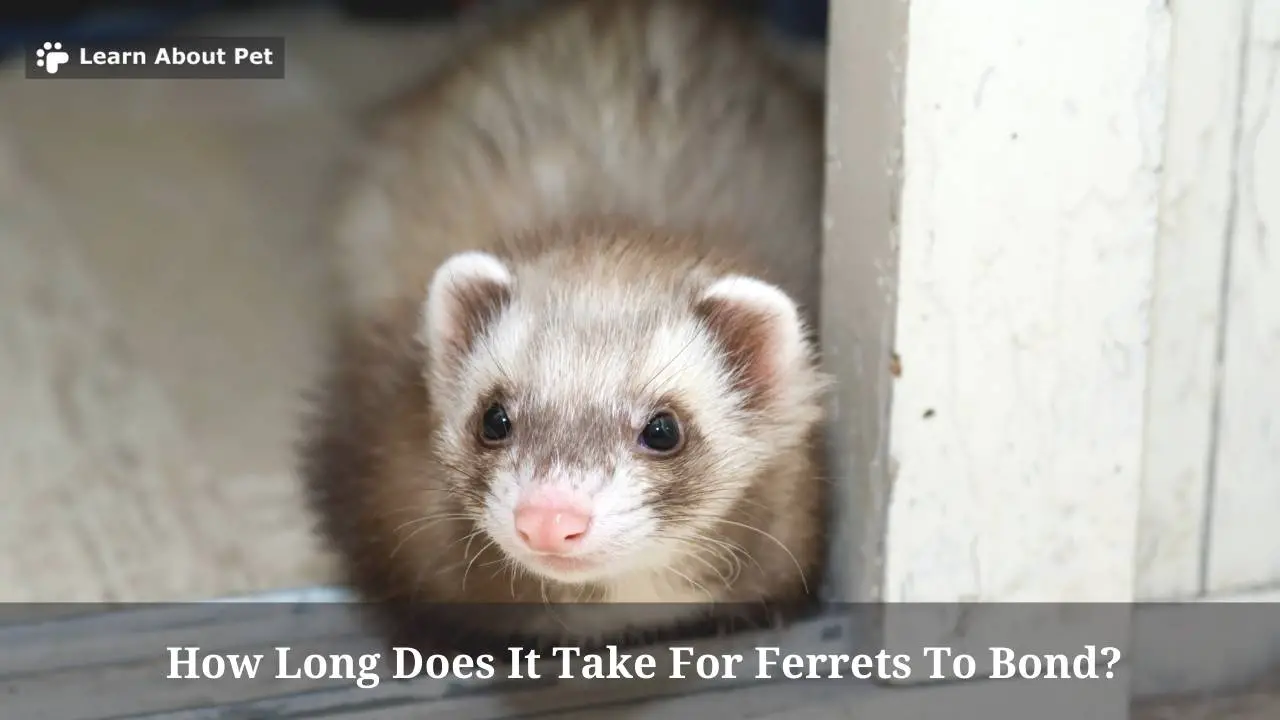Ferrets are social animals, which are capable of forming bonds with each other. However, the process of ferrets bonding with one another is not always instantaneous. In this article, you will find information on how long it takes for ferrets to bond.
How long does it take for ferrets to bond? Bonding between ferrets can take as little as 1 week, and as much as 6 months. The most important thing is to ensure that you don’t lose patience, as you try to get your ferrets to bond.
You also need to beware of the fact that some ferrets are simply incompatible. They may never get to a point of bonding.
So there are ferrets that may never get along – however long they keep encountering each other for.

With regard to ferret socialization and bonding issues, there are many nuances.
Much also depends on the profiles of the ferrets in question. For instance, while introducing a baby ferret to an older ferret, the challenges may be different. They may differ from those that would come into play while introducing adult ferrets.
Similarly, while introducing a male ferret to another male, the issues may be different. They may be different from, say, what you would encounter while introducing a male ferret to a female ferret.
Introducing a new ferret to a previous loner also comes with unique challenges. Those challenges are different from the ones you’d encounter while dealing with two ferrets that both had good social exposure previously.
Thus ferret socialization and bonding issues are complex and high nuanced.
Do Ferrets Form Bonds?
Ferrets do form bonds. They are social animals, and they have strong social affinity instincts. As such, they are capable of forming bonds among themselves.
Ferrets are also capable of forming bonds with their caregivers and owners.
We do, however, need to point out that the ease with which ferrets form bonds isn’t uniform. Some ferrets seem to form bonds more easily than others.
Those difficulties in forming proper bonds can, unfortunately, be the genesis of aggressive ferret behavior to other ferrets.
Sometimes, the aggressiveness can be savage: often with an old ferret attacking new ferret. So fierce can the attacks get that you even start wondering, will a ferret kill another ferret?
Before the bonding process goes through, the ferrets may engage in duels. Sometimes, the nature of these duels is such that one starts having questions on how to tell if ferrets are fighting or playing.
Thus while we say that ferrets do form bonds, the bonding process is not always easy. People often ask, is it hard to introduce ferrets to each other? And the answer is ‘yes’ – at times, introducing ferrets to each other can be very challenging.
Indeed, it is partly on account of these bonding challenges that you often find a ferret owner wondering, should I get another ferret for my ferret? And if yes, how can you introduce two ferrets to each other properly?
Sometimes, challenges even arise in the context of the ferrets bonding with their owners. So you find a ferret owner complaining about ferret not bonding with me, anything I can do?
That then gives rise to the question on how do I bond with my ferret.
All in all though, the basic fact is that ferrets are capable of forming bonds.
How Long Does It Take For Ferrets To Bond?
The period of time it takes for ferrets to bond varies. It can be as short as one week. And it can be as long as 6 months. Sometimes, the ferrets fail to bond altogether.
If you were to get any representative sample of pet ferret owners, and ask them, how long did it take you to bond with your ferrets, you would get a wide range of answers.
Some will tell you that the bonding process was very fast: taking as little as one week. Others will tell that it was a long, painstaking process: taking as long as 6 months. There are even those who will tell you that it failed completely.
What Determines How Long It Takes For Ferrets To Bond?
How long it takes for ferrets to bond seems to depend greatly on the personalities of the ferrets in question.
It also depends on how well the ferrets are aided in the bonding process. So there are some things you may do to get the bonding process to possibly go faster.

How Do I Help My Ferret Bond With Another One Fast?
One method is to ensure that you only introduce the new ferret in some sort of ‘neutral territory’. That is as opposed to just bringing the new ferret to what the old ferret regards as ‘its’ territory.
Now just convey the two ferrets into the ‘neutral ground’ at once: so that none finds the other one already there.
Then let the ferrets just stay in that area for some time. All the while, be supervising them. If they start to fight, separate them.
Keep on exposing them to each other on a regular basis, until they get used to each other.
In due course, they should go beyond being used to each other, and actually befriend each other: thus forming bonds.
Just remember that there is no fixed period of time within which these bonds have to go through.
As we said (while answering the how long does it take for ferrets to bond question), the bonds can develop in as little as a single week. Or they can take as many as 24 weeks (6 months) to form.
There is also the possibility of the ferrets proving to be incompatible. If you have two completely incompatible ferrets, no bonds will ever form between them – however long you keep on exposing them to one another.
Thankfully, such cases of ferrets proving totally incompatible are rare.
How To Know If Your Ferrets Are Bonded?
Ferrets are said to have bonded if they start to like each other.
So the question here should be, how do I know if my ferrets like each other? In practical terms, that is really how to tell if ferrets are bonded.
Now the first sign that ferrets are bonded is if you find them grooming each other.
The other key sign that ferrets are bonded is if you find them sleeping together.
Once you see these signs, you know that the ferrets are bonded. That then brings other challenges, like with regard to how can you separate bonded ferrets, and what to do when a bonded ferret dies.
Ultimately though, the ferrets grooming each other and sleeping together are the signs of successful bonding.
Final Verdict – How Long Does It Take For Ferrets To Bond
Sometimes, ferrets bond with each other fairly fast: in as little as one week. At other times, ferrets bond with each other rather slowly: with the process taking as much as 6 months.
Those are also the timelines within which the ferrets typically bond with their owners.
There are also instances in which ferrets simply fail to ever bond with each other.
Thus while introducing ferrets to each other, you need to know that there are three possible outcomes. The ferrets may bond fast. Or the ferrets may bond slowly. It is also possible for the ferrets to fail to bond altogether.

You can increase chances of the bonding process going faster and smoothly by taking certain steps. Firstly, only introduce the ferrets to each other on neutral ground: not on a ground that any of the ferrets has come to regard as ‘its’ territory.
Also ensure that you expose the ferrets to each other for brief periods initially. Then add the exposure times gradually. Break up any fights that arise firmly but without being too forceful.
You will know that your ferrets have bonded when you find them grooming each other and sleeping together. That may happen in as little as one week. Or it could take as many as 6 months before happening.
As a pet lover, make sure to learn about pet more and give your pet ferret a good and comfortable life!

Welcome to Learn About Pet. My name is Rajkumar Ravichandran and I love all pets, travel, and amazing food. I write about my passion and personal experience caring for multiple pets in this blog! ❤️
Post Disclaimer
DISCLAIMER: THIS BLOG OR WEBSITE, "Learn About Pet", DOES NOT PROVIDE YOU WITH MEDICAL ADVICE AND IS NOT A SUBSTITUTE FOR MEDICAL ADVICE. ALWAYS GET IN TOUCH WITH YOUR PERSONAL VETERINARIAN AND USE INFORMATION HERE AS GENERAL ADVICE.
The information, including but not limited to, text, graphics, images and other material contained on this website are for informational purposes only. No material on this site is intended to be a substitute for professional veterinary advice, food recommendation, diagnosis, or treatment. Always seek the advice of your veterinarian or other qualified health care provider with any questions you may have regarding a medical condition or for pet food related questions.







